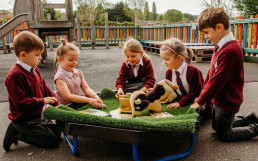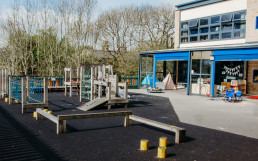- Home
- Teaching & Learning
- Early Years Foundation Stage
Early Years Foundation Stage
The period from age three to the end of the Reception year is described as the Early Years Foundation Stage at St Oswald’s. It is a distinct stage and important both in its own right and in preparing children for later schooling. At St Oswald’s we currently have one Nursery Class (Acorn) and two Reception Classes (Apple & Cherry) within our Early Years Foundation Stage.

Intent
The St Oswald’s Early Years curriculum is designed to provide our pupils with the foundations for a love of lifelong learning. We aim to inspire them, and to give them knowledge which enables them to engage with and communicate about the world beyond their lived experience and above all, help them to flourish. We aim for our children to be confident and independent, to believe in themselves and interact positively with others. We understand that play is an integral part of learning and this is at the heart of our Early Years curriculum.
Our ethos in Early Years is to support children’s personal, social and emotional development so that they feel safe and secure and are ready to learn. We believe that the correct mix of adult directed and uninterrupted child-initiated play ensures the best outcomes for pupils. Warm and positive relationships between staff and children, consistent routines and strong relationships with parents are key. We recognise the crucial role that Early Years education has to play in providing firm foundations upon which the rest of a child’s education is successfully based.
We have developed a curriculum for our children in Nursery and Reception that meets the requirements of the Early Years Foundation Stage statutory framework, drawing upon Development Matters 2021. In our Foundation Stage we offer a broad and balanced Early Years Curriculum based on the seven areas of learning;
- Prime Learning Areas
- Personal, social and emotional development
- Physical development
- Communication and language
- Specific Learning Areas
- Mathematics
- Literacy
- Understanding the world
- Expressive arts and design
To learn well, children must approach opportunities with curiosity, energy and enthusiasm. We support the children to develop effective learning habits through the Characteristics of Effective Learning:
-
- Playing and Exploring – children investigate and experience things and ‘have a go’
- Active Learning – Children concentrate and keep trying if they encounter difficulties, they enjoy achievements
- Creating and Thinking Critically – children have and develop their own ideas, make links between ideas and develop strategies for doing things

Implementation
The children are supported to learn to work together, manage their feelings and ask questions through skilled adult facilitated play. The curriculum is taught through topics which are enriched with classroom enhancements, trips and visitors. Topics are supported by quality key texts. These are chosen carefully to encourage children’s speech, language and communication development. All planning however, is flexible and responsive to children’s needs so plans can be changed and adapted depending on children’s interests.
We create a stimulating environment to encourage children to free-flow between inside and outside. Our classrooms and outdoor areas are set up with areas of learning, offering continuous provision to build upon and deepen previous experiences. Continuous provision provides children with stimulating, active play to encourage the above characteristics of learning. We understand that outdoor play is of equal importance as indoor play.
We ensure there is a balance of child-initiated learning through continuous provision, and adult led activities, across the school day. Although much of the time is spent with children self-selecting tasks, the interaction between the adult and child is essential. The adults respond to each child’s emerging needs and interests, guiding their development through warm, positive interaction. The adult’s role is to continually model, demonstrate and question what the child is doing. In some cases, the adult will ask a child to complete a task with them; at other times they will participate in the child’s play, extending it where possible.
There are set routines that we follow each day. There are designated times when the children come together to be taught and we focus on phonics, literacy, math’s and topic work. These times provide the opportunity for children to develop their ability to work as a group to listen, to take turns, to answer and concentrate. Whole class reading and story time are important parts of the day. We want our children to develop a lifelong love of reading. Children are exposed to a wide range of both fiction and non-fiction texts to provide them with opportunities to hear and use new vocabulary. We imitate, innovate and invent stories through a Talk for Writing approach as we want our children to leave the EYFS knowing stories, both traditional and modern well.
We make observations of children’s learning which enable us to move learning forward in a way which is appropriate to each child’s stage in their development. We record observations using the online assessment tool Tapestry. Parents and carers are able to access Tapestry at home to respond to learning that has been put on there and also to document home experiences.
Impact
Our wonderful curriculum and its precise delivery ensures that children, from their own starting points, make good progress so that they meet the national expectation for GLD at the end of the year. Our pedagogy is focused on supporting children to access carefully chosen resources, practice their skills, and scaffold and extend learning in a play-based setting.
Assessment is based on next steps – what does each child need to develop their skills, knowledge and understanding? This requires our early years team to really know each child well, so assessment is tailored to the child.
Our high standards of progress and achievement are driven by an enriched curriculum, enabling environment, and rigorous assessment processes. Children develop their characteristics of learning and are able to apply their knowledge to a range of situations making links and explaining their ideas and understanding. Children are confident to take risks and discuss their successes and failures with peers and adults drawing on their experiences to improve or adjust what they are doing. We believe our high standards are due to our carefully planned environment, enriched play-based curriculum, quality first teaching and the rigour of assessment.